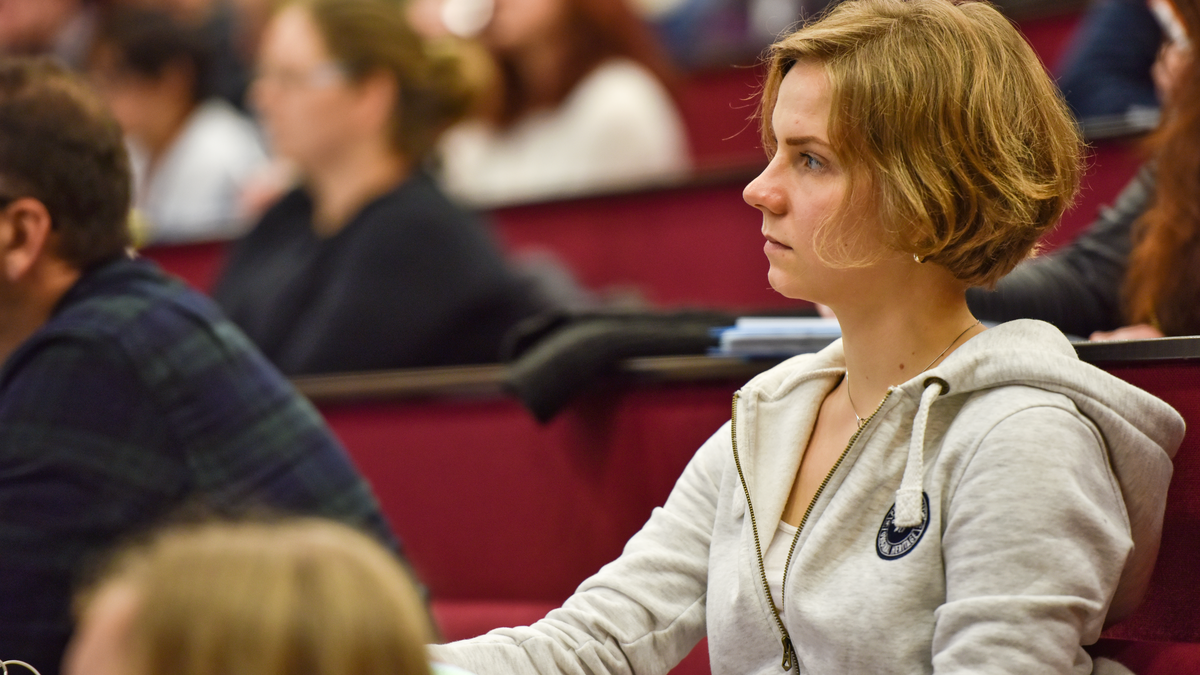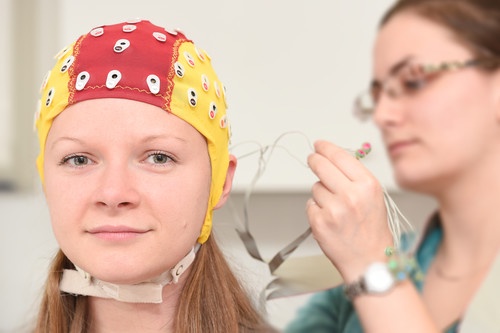Danai Papadaki

This MRes degree programme provides you with comprehensive training in the skills required for psychological research. You will attend lectures and participate in hands-on workshops, and complete a research project supervised one-on-one by an academic member of staff.

The University of Aberdeen has one of the longest established departments of Psychology in the UK with a long tradition of high-quality research training.
The Masters of Research (MRes) course consists of several smaller taught modules and one large research module, lasting for one year of full-time study. The taught courses develop core skills required for research, including reviewing the literature, managing projects, preparing funding applications, disseminating your research through presentations and papers, and communicating with non-academic audiences. There will be training in IT skills, advanced statistics, and sessions on both quantitative and qualitative research design. These are taught using a combination of lectures and workshops, and use frequent assessment and feedback to ensure you develop a deep understanding of the skills and knowledge needed for a successful research career.
A major component of the MRes is the individual research project, supervised by an academic member of staff. These present an opportunity to put the acquired research skills into practice and work with experts in the field to answer cutting-edge questions in psychology. Please see a list of potential research projects that staff are willing to supervise.
This course, which is prescribed for all taught postgraduate students, is studied entirely online, takes approximately 5-6 hours to complete and can be taken in one sitting, or spread across a number of weeks.
Topics include orientation overview, equality and diversity, health, safety and cyber security and how to make the most of your time at university in relation to careers and employability.
Successful completion of this course will be recorded on your Enhanced Transcript as ‘Achieved’.
15 Credit Points
The initial lectures of this course provide introductory information that is essential for new postgraduate students. The subsequent lectures and assessments develop essential research skills and knowledge such as academic writing, ethics and grant writing.
15 Credit Points
In order to conduct research in Psychology, students will need to use specialized software and learn some basic programming. This course provides instructive lectures on how to use some of the more widely adopted and useful software suites and programming languages, accompanied by workshops in which students perform PC based exercises to practice their skills.
15 Credit Points
A thorough understanding of common statistical techniques and the ability to apply them is essential to conduct research in Psychology. This course provides lectures on the most important statistical techniques in Psychology accompanied by workshops in which students perform PC based data analysis exercises.
15 Credit Points
This course provides an overview of a range of qualitative and quantitative research methods in psychology.
15 Credit Points
This course provides lectures on a range of more specific and/or advanced research skills than those provided in Term 1 such as Philosophy of Science and Career Development.
15 Credit Points
This course covers statistical topics that go beyond the scope of what is normally taught at undergraduate level. The topics covered help researchers surpass the limitations of standard statistical approaches (e.g. NHST).
This course runs over the whole session.
Assessment: By a combination of written examination and course work, as prescribed for each course. In addition, MRes candidates must must submit a dissertation on their project, and will be required to undergo oral examination.
90 Credit Points
A major component of the MRes is the Research Module. For this, students complete their own research project supervised by a member of staff who is an expert in the relevant field. They also attend departmental seminars and present their research at a postgraduate psychologia.
We will endeavour to make all course options available; however, these may be subject to timetabling and other constraints. Please see our InfoHub pages for further information.
| Fee category | Cost |
|---|---|
| EU / International students | £27,000 |
| Tuition Fees for 2024/25 Academic Year | |
| UK | £11,100 |
| Tuition Fees for 2024/25 Academic Year |
Further Information about tuition fees and the cost of living in Aberdeen
The University of Aberdeen is very pleased to offer a 20% discount on postgraduate tuition fees for all alumni who have graduated with a degree from the University of Aberdeen. More information can be found on our Finance and Funding page.
Self-funded international students enrolling on postgraduate taught (PGT) programmes will receive one of our Aberdeen Global Scholarships, ranging from £3000 to £8,500, depending on your domicile country. Learn more about the Aberdeen Global Scholarships here.
To see our full range of scholarships, visit our Funding Database.
Teaching consists of lectures, seminars, tutorials and practical classes. A lot of research training is through hands-on learning by designing and running studies and analysing data in close coordination with supervisors. Most of the teaching proceeds in small groups, allowing for individual support and feedback. The research project is guided by individual meetings with the supervisor. A further member of staff, the assessor, will provide feedback on all assessments related to the research module.
You can supplement your required courses with a wide range of other courses and skills training sessions offered by the University of Aberdeen. Being part of an active and collaborative research unit means you are also welcome at our many informal seminars, research meetings, and workshops.
Assessment includes weekly worksheets, small projects, essays, exams, oral ad poster presentations, and a final thesis reporting your research project.
View the list of potential projects and staff research interests on our School website to select areas of research which interest you. You should specify in your personal statement three members of academic staff that you might be interested in doing a research project with during the MRes. Note that this does not commit you or the School to carrying out a project with these particular supervisors. You are welcome to contact potential supervisors during the application process to find out more about their research interests. You do not need to prepare a research proposal at this stage.
A list of staff and their research interests and example projects can be found on our School website.
The information below is provided as a guide only and does not guarantee entry to the University of Aberdeen.
A 2:1 degree in Psychology or a cognate discipline.
Please check our International student pages for country-specific requirements.
Please enter your country to view country-specific entry requirements.
To study for a Postgraduate Taught degree at the University of Aberdeen it is essential that you can speak, understand, read, and write English fluently. The minimum requirements for this degree are as follows:
IELTS Academic:
OVERALL - 6.5 with: Listening - 5.5; Reading - 5.5; Speaking - 5.5; Writing - 6.0
TOEFL iBT:
OVERALL - 90 with: Listening - 17; Reading - 18; Speaking - 20; Writing - 21
PTE Academic:
OVERALL - 62 with: Listening - 59; Reading - 59; Speaking - 59; Writing - 59
Cambridge English B2 First, C1 Advanced, C2 Proficiency:
OVERALL - 176 with: Listening - 162; Reading - 162; Speaking - 162; Writing - 169
Read more about specific English Language requirements here.
You will be required to supply the following documentation with your application as proof you meet the entry requirements of this degree programme. If you have not yet completed your current programme of study, then you can still apply and you can provide your Degree Certificate at a later date.
Eligible self-funded post graduate taught (PGT) students will receive the Aberdeen Global Scholarship. Explore our Global Scholarships, including eligibility details, on our dedicated page.
Aberdeen Global ScholarshipsThis programme provides an excellent platform for those students wanting to pursue a career in psychological research, particularly those wishing to study towards a PhD. The transferrable skills included in the MRes programme would also be useful for careers in other fields. Potential careers for MRes Psychology graduates include human factors, industrial research, data science and business administration. Many employers seek psychology graduates as people with an understanding of human behaviour and knowledge of data processing.
The School of Psychology provides an exciting and vibrant research environment. Our degrees are taught by a range of experts across our 3 research themes, Cognition, Perception and Attention and Social Cognition.
You will be taught by a range of experts including professors, lecturers, teaching fellows and postgraduate tutors. Staff changes will occur from time to time; please see our InfoHub pages for further information.

This facility consists of several spacious rooms that house electroencephalographic (EEG) equipment and sound-attenuated, shielded testing booths.

The School of Psychology has four in-house eye trackers. The Eyelink 1000 system allows the recording of eye gaze at a sampling rate of 1000 Hz.

The University’s award winning Sir Duncan Rice Library is listed in the “Top 20 spellbinding University libraries in the World”. It contains over a million volumes, more than 300,000 e-books and 21,000 journals.
Find out more